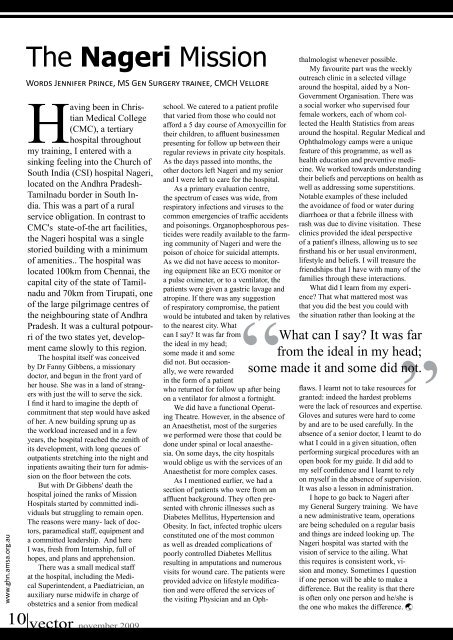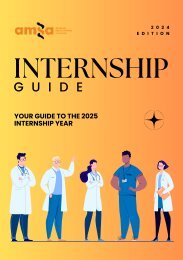Create successful ePaper yourself
Turn your PDF publications into a flip-book with our unique Google optimized e-Paper software.
www.ghn.amsa.org.au<br />
The Nageri Mission<br />
Words Jennifer Prince, MS Gen Surgery trainee, CMCH Vellore<br />
Having been in Christian<br />
Medical College<br />
(CMC), a tertiary<br />
hospital throughout<br />
my training, I entered with a<br />
sinking feeling into the Church of<br />
South India (CSI) hospital Nageri,<br />
located on the Andhra Pradesh-<br />
Tamilnadu border in South India.<br />
This was a part of a rural<br />
service obligation. In contrast to<br />
CMC's state-of-the art facilities,<br />
the Nageri hospital was a single<br />
storied building with a minimum<br />
of amenities.. The hospital was<br />
located <strong>10</strong>0km from Chennai, the<br />
capital city of the state of Tamilnadu<br />
and 70km from Tirupati, one<br />
of the large pilgrimage centres of<br />
the neighbouring state of Andhra<br />
Pradesh. It was a cultural potpourri<br />
of the two states yet, development<br />
came slowly to this region.<br />
The hospital itself was conceived<br />
by Dr Fanny Gibbens, a missionary<br />
doctor, and begun in the front yard of<br />
her house. She was in a land of strangers<br />
with just the will to serve the sick.<br />
I find it hard to imagine the depth of<br />
commitment that step would have asked<br />
of her. A new building sprung up as<br />
the workload increased and in a few<br />
years, the hospital reached the zenith of<br />
its development, with long queues of<br />
outpatients stretching into the night and<br />
inpatients awaiting their turn for admission<br />
on the floor between the cots.<br />
But with Dr Gibbens' death the<br />
hospital joined the ranks of Mission<br />
Hospitals started by committed individuals<br />
but struggling to remain open.<br />
The reasons were many- lack of doctors,<br />
paramedical staff, equipment and<br />
a committed leadership. And here<br />
I was, fresh from Internship, full of<br />
hopes, and plans and apprehension.<br />
There was a small medical staff<br />
at the hospital, including the Medical<br />
Superintendent, a Paediatrician, an<br />
auxiliary nurse midwife in charge of<br />
obstetrics and a senior from medical<br />
school. We catered to a patient profile<br />
that varied from those who could not<br />
afford a 5 day course of Amoxycillin for<br />
their children, to affluent businessmen<br />
presenting for follow up between their<br />
regular reviews in private city hospitals.<br />
As the days passed into months, the<br />
other doctors left Nageri and my senior<br />
and I were left to care for the hospital.<br />
As a primary evaluation centre,<br />
the spectrum of cases was wide, from<br />
respiratory infections and viruses to the<br />
common emergencies of traffic accidents<br />
and poisonings. Organophosphorous pesticides<br />
were readily available to the farming<br />
community of Nageri and were the<br />
poison of choice for suicidal attempts.<br />
As we did not have access to monitoring<br />
equipment like an ECG monitor or<br />
a pulse oximeter, or to a ventilator, the<br />
patients were given a gastric lavage and<br />
atropine. If there was any suggestion<br />
of respiratory compromise, the patient<br />
would be intubated and taken<br />
“<br />
by relatives<br />
to the nearest city. What<br />
can I say? It was far from<br />
the ideal in my head;<br />
some made it and some<br />
did not. But occasionally,<br />
we were rewarded<br />
in the form of a patient<br />
who returned for follow up after being<br />
on a ventilator for almost a fortnight.<br />
We did have a functional Operating<br />
Theatre. However, in the absence of<br />
an Anaesthetist, most of the surgeries<br />
we performed were those that could be<br />
done under spinal or local anaesthesia.<br />
On some days, the city hospitals<br />
would oblige us with the services of an<br />
Anaesthetist for more complex cases.<br />
As I mentioned earlier, we had a<br />
section of patients who were from an<br />
affluent background. They often presented<br />
with chronic illnesses such as<br />
Diabetes Mellitus, Hypertension and<br />
Obesity. In fact, infected trophic ulcers<br />
constituted one of the most common<br />
as well as dreaded complications of<br />
poorly controlled Diabetes Mellitus<br />
resulting in amputations and numerous<br />
visits for wound care. The patients were<br />
provided advice on lifestyle modification<br />
and were offered the services of<br />
the visiting Physician and an Ophthalmologist<br />
whenever possible.<br />
My favourite part was the weekly<br />
outreach clinic in a selected village<br />
around the hospital, aided by a Non-<br />
Government Organisation. There was<br />
a social worker who supervised four<br />
female workers, each of whom collected<br />
the Health Statistics from areas<br />
around the hospital. Regular Medical and<br />
Ophthalmology camps were a unique<br />
feature of this programme, as well as<br />
health education and preventive medicine.<br />
We worked towards understanding<br />
their beliefs and perceptions on health as<br />
well as addressing some superstitions.<br />
Notable examples of these included<br />
the avoidance of food or water during<br />
diarrhoea or that a febrile illness with<br />
rash was due to divine visitation. These<br />
clinics provided the ideal perspective<br />
of a patient's illness, allowing us to see<br />
firsthand his or her usual environment,<br />
lifestyle and beliefs. I will treasure the<br />
friendships that I have with many of the<br />
families through these interactions.<br />
What did I learn from my experience?<br />
That what mattered most was<br />
that you did the best you could with<br />
the situation rather than looking at the<br />
What can I say? It was far<br />
from the ideal in my head;<br />
some made it and some did not.<br />
”<br />
flaws. I learnt not to take resources for<br />
granted: indeed the hardest problems<br />
were the lack of resources and expertise.<br />
Gloves and sutures were hard to come<br />
by and are to be used carefully. In the<br />
absence of a senior doctor, I learnt to do<br />
what I could in a given situation, often<br />
performing surgical procedures with an<br />
open book for my guide. It did add to<br />
my self confidence and I learnt to rely<br />
on myself in the absence of supervision.<br />
It was also a lesson in administration.<br />
I hope to go back to Nageri after<br />
my General Surgery training. We have<br />
a new administrative team, operations<br />
are being scheduled on a regular basis<br />
and things are indeed looking up. The<br />
Nageri hospital was started with the<br />
vision of service to the ailing. What<br />
this requires is consistent work, vision<br />
and money. Sometimes I question<br />
if one person will be able to make a<br />
difference. But the reality is that there<br />
is often only one person and he/she is<br />
the one who makes the difference. <br />
<strong>10</strong> vector november <strong>2009</strong>
















